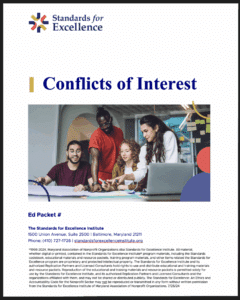The Standards for Excellence Institute has an extensive library of educational resource packets for nonprofit organizations interested in implementing the Standards for Excellence: An Ethics and Accountability Code for the Nonprofit Sector.
 The resource packets include extensive information on implementing specific standards, background information about the standards, best practices associated with each standard, model procedures, and sample policies.
The resource packets include extensive information on implementing specific standards, background information about the standards, best practices associated with each standard, model procedures, and sample policies.
The Standards for Excellence educational resource packets were prepared by conducting an exhaustive review of literature on a particular topic, curating the most useful information, creating original materials (including model policies) where the available information is not sufficient, and packaging the materials in an easy-to-use format. The resources are updated regularly with new information and current practices.
Collectively, the resources cover each of the 67 standards in the Standards for Excellence code. These resource packets are available to members of the Standards for Excellence Institute and Replication Partners.